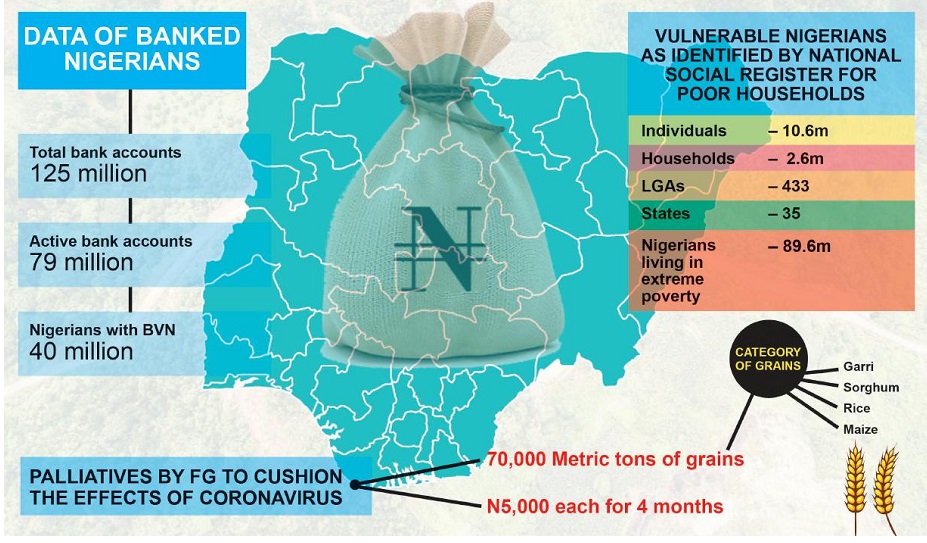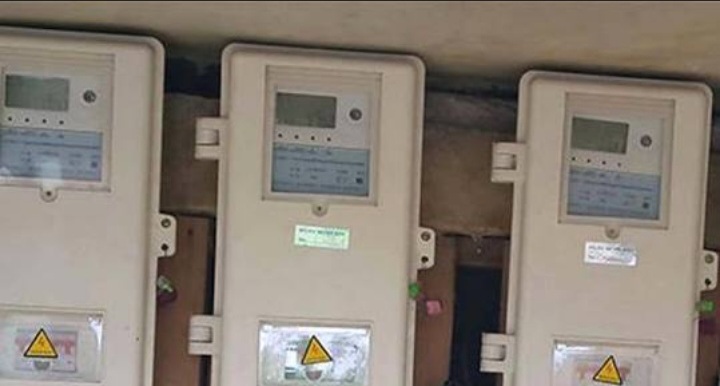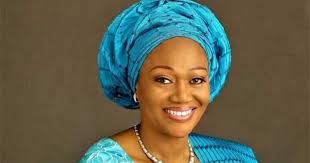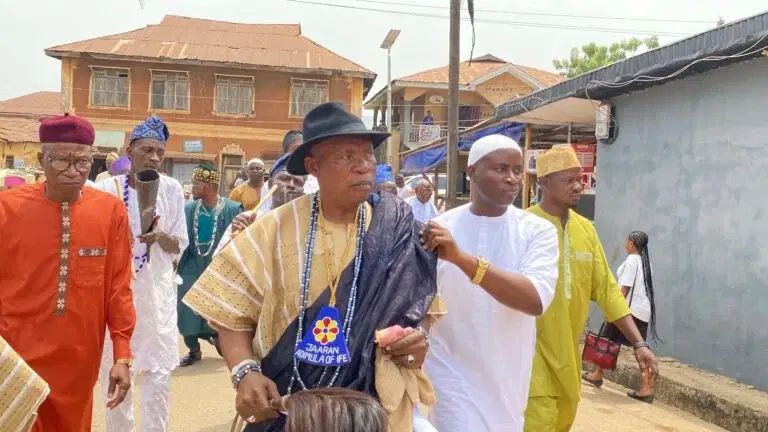Poor database hinders palliative distribution to Nigerians

By Philip Shimnom Clement
…As FG begins conditional cash, grain disbursements
…Current social database of poor households inaccurate – Expert
…Only 40m Nigerians have BVN – Data
Nigeria’s poor data base is posing a daunting challenge to Federal Government’s effort in providing palliatives to poor Nigerians due to the impact of the Coronavirus pandemic.

President Muhammadu Buhari during a nationwide broadcast on Sunday, 29th March, 2020 ordered a total lockdown of Lagos, the epicenter of the virus, together with the Federal Capital Territory and Ogun State for two weeks, which many states also joined afterwards in a bid to contain further spread of the virus.
The president also ordered conditional cash transfer to vulnerable Nigerians for the next four months, as well as disbursement of 70,000 grains from the national grain reserves to be distributed nationwide.
Subsequently, Sadiya Farouk, minister of Humanitarian Affairs, Disaster Management and Social Sevelopment, said the ministry in collaboration with other agencies has commenced cash transfer to poorest households in the country to cushion effect of the coronavirus pandemic.
The minister said this during a press briefing by the presidential task force on the disease in Abuja.
She said the vulnerable group will also be expanded to consider more persons during the infection period.
“In Mr. President’s speech, paragraph 54, he directed that the conditional cash transfer should be given in advance of two months. This we have also done. We have directed immediate cash transfer to the poorest and most vulnerable households in the country.
“Because of this COVID-19, the vulnerable groups have to expanded, because we are aware that there are people who live on daily wage, so we are also going to look at those groups of people to see how we can get this food relief intervention to them in this period,” she said.
Also, the Secretary to the Government of the Federation (SGF) and Chairman of the Presidential Task Force (PTF) on COVID-19, Boss Mustapha, said that the president has approved the release of 70,000 metric tonnes of grains from the National Grain Reserve to be shared to vulnerable persons in the country as part of the palliative measures for the COVID-19 pandemic.
He said: “60,000 metric tonnes of the grains would be shared to the vulnerables in FCT, Lagos and Ogun states, which are presently on lockdown, while the remaining 10,000 metric tonnes would be shared to the vulnerables in other frontline states across the country.
“We have received situation reports from the Federal Road Safety Corps (FRSC) on Inter-State traffic across the country as at Tuesday, 31st March, 2020.
“Indications are that there was a reasonable level of compliance with the Presidential directive which has led to great reduction of traffic on major highways.
“We have however received reports of challenges arising from the enforcement of the Presidential directives by security agents generally and in States where Governors have also imposed their own measures”.
The category of grains to be distributed includes sorghum, rice, maize and garri which are major staple food consumed by Nigerians on a daily basis.
He also said that the PTF has developed an Implementation Guide and Protocols for the COVID-19 Lockdown Policy, which would be widely circulated to all security agencies and will be discussed with sub-national entities for the purpose of building synergy in the fight against the virus.
However, there are questions as to how the Federal Government through the Ministry of Humanitarian Affairs arrived at the 10.6 million number of vulnerable Nigerians which it earmarked to provide conditional cash transfer as there is no legitimate data to prove who is vulnerable and who is not vulnerable currently in the country especially in the face of economic hardship being faced by Nigerians due to the impact of the virus.
Currently, economic activities are on standstill and Small and Medium Enterprises in the country are feeling the brunt.
In the same category are Nigerians who do menial jobs on a daily basis and rely on daily pay for their survival, who have now been asked to stay at home without food and money to sustain themselves and their families.
These category of people include a large number from the informal sector like petty traders who are considered as providing non-essential services, cleaners, sales boys/girls, taxi drivers and other commercial taxi, tricycles and motorcycles operators.
For these category of people above, many analysts and public affairs commentators believe that they should be captured by the Federal Government as ‘vulnerable’ and given palliatives to survive until the pandemic fazes off.
Data sourced by the Daily Times from the National Social Register of Poor and Vulnerable Households as at 29th February 2020 shows that that total number of vulnerable Nigerians are 10, 695,360. These individuals were identified from 2,556,460 households in 49,948 communities.
Consequently, the 49,948 communities were identified from 4,819 wards of 433 Local governments in 35 states of the federation.
A renowned economist and professor of capital markets, Uche Uwaleke said there is no specific data that captures two categories of Nigerians which are the poor and unemployed.
Due to the Nigeria’s defective database, he said it is virtually impossible to effectively implement the different palliative measures put in place by the Federal Government.
According to him, in the United States and other developed nations, food items and other palliatives are delivered at the door steps of vulnerable citizens, but Nigeria has not built its database to that extent yet, adding that the number of vulnerable Nigerians must have surpassed the figure announced the Federal Government.
“Nigeria as you know is declared the poorest in the world by World Poverty Clock despite our huge potentials as we have about 90 million (49%) of our entire population of 200 million living in extreme poverty.
“Unemployment is over 20 per cent and it is estimated that over 140 million Nigerians which forms majority of the country’s population cannot afford $2 equivalent of N760. Therefore the method used to arrive at that 10.6 million may not really be accurate,” he stated.
He said the development is also necessitating questions by Nigerians who think tracking the disbursements may really be difficult.
In another development, latest Statistics from the Nigeria Interbank Settlement System (NIBSS) shows that as at December 2019, registration for Bank Verification Number by bank account owners within the country stood at 40 million.
This development made analysts to describe the BVN as the most verifiable and consistent data which the country has compared to other official biometric exercises like the National Identity Management Commission’s National Identity Number (NIN).
Also, statistics from the Central Bank of Nigeria shows that there are 125 million total bank accounts in Nigeria as at January 2020. Out of this, 79 million are active. There are, however, 25 million current account holders, while 96 million people in the country operate savings accounts.
Consequently, with a population of over 200 million people, only 40 million bank accounts with bank verification numbers is said to be inadequate for federal government to trace and provide palliatives for.
Moreover, majority of ‘vulnerable’ Nigerians do not even operate bank accounts especially in the rural areas and hinterlands, but rather depend on piggy bank and contributions among each other otherwise known as ‘Adashe’.
READ ALSO: Pro-Buhari group hails tax agency for increased revenue
In fact, the Minister of Finance, Budget and National Planning, Zainab Shamsuna Ahmed, admitted that the Federal Government will have the challenge of data in distributing its palliatives in parts of the country, with the exemption of the northeast where many humanitarian aids have been carried out there, and as such have tangible data of vulnerable individuals hit by the insurgency.
Also, former vice president, Atiku Abubakar, had called on the Federal Government to wire N10,000 each to the accounts of Nigerians who have bank verification numbers as part of palliatives to cushion the hardship being faced.
However, analysts had argued that many individuals with Bank verification numbers do not fall into the category of vulnerable Nigerians as majority of people who need the money still remain unbanked.
As such, the need to build an effective data bank for citizens is crucial going forward to avoid the current challenge being faced now in effective distribution of the palliatives to ‘vulnerable’ Nigerians.










